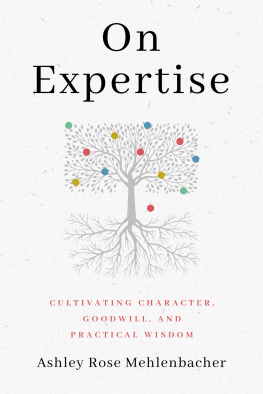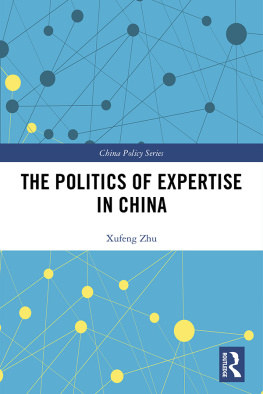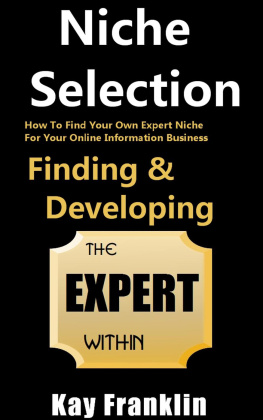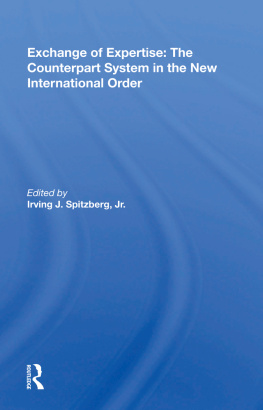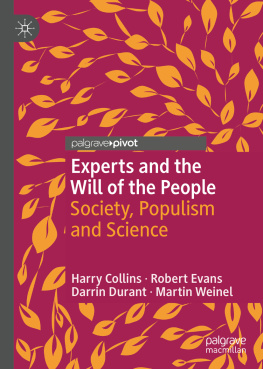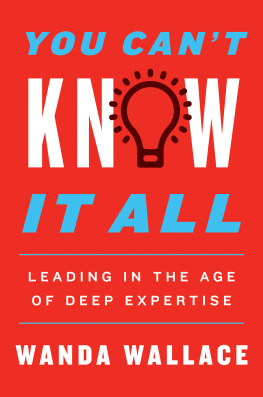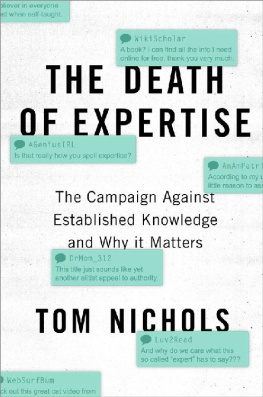Table of Contents
Guide
ON EXPERTISE
R SA ST R
THE RSA SERIES IN TRANSDISCIPLINARY RHETORIC
Edited by
Michael Bernard-Donals (University of Wisconsin) and
Leah Ceccarelli (University of Washington)
Editorial Board:
Diane Davis, The University of Texas at Austin
Cara Finnegan, University of Illinois at Urbana-Champaign
Debra Hawhee, The Pennsylvania State University
John Lynch, University of Cincinnati
Steven Mailloux, Loyola Marymount University
Kendall Phillips, Syracuse University
Thomas Rickert, Purdue University
The RSA Series in Transdisciplinary Rhetoric is a collaboration with the Rhetoric Society of America to publish innovative and rigorously argued scholarship on the tremendous disciplinary breadth of rhetoric. Books in the series take a variety of approaches, including theoretical, historical, interpretive, critical, or ethnographic, and examine rhetorical action in a way that appeals, first, to scholars in communication studies and English or writing, and, second, to at least one other discipline or subject area.
Other titles in this series:
Nathan Stormer, Sign of Pathology: U.S. Medical Rhetoric on Abortion, 1800s1960s
Mark Longaker, Rhetorical Style and Bourgeois Virtue: Capitalism and Civil Society in the British Enlightenment
Robin E. Jensen, Infertility: A Rhetorical History
Steven Mailloux, Rhetorics Pragmatism: Essays in Rhetorical Hermeneutics
M. Elizabeth Weiser, Museum Rhetoric: Building Civic Identity in National Spaces
Chris Mays, Nathaniel A. Rivers and Kellie Sharp-Hoskins, eds., Kenneth Burke + The Posthuman
Amy Koerber, From Hysteria to Hormones: A Rhetorical History
Elizabeth C. Britt, Reimagining Advocacy: Rhetorical Education in the Legal Clinic
Ian E. J. Hill, Advocating Weapons, War, and Terrorism: Technological and Rhetorical Paradox
Kelly Pender, Being at Genetic Risk: Toward a Rhetoric of Care
James L. Cherney, Ableist Rhetoric
Susan Wells, Robert Burtons Rhetoric: An Anatomy of Early Modern Knowledge
Ralph Cintron, Democracy as Fetish
Maggie M. Werner, Stripped: Reading the Erotic Body
Timothy Johnson, Rhetoric, Inc: Fords Filmmaking and the Rise of Corporatism
James Wynn and G. Mitchell Reyes, eds., Arguing with Numbers: Essays at the Intersections of Rhetoric and Mathematics
Ashley Rose Mehlenbacher
ON EXPERTISE
Cultivating Character, Goodwill, and Practical Wisdom
THE PENNSYLVANIA STATE UNIVERSITY PRESS
UNIVERSITY PARK, PENNSYLVANIA
Library of Congress Cataloging-in-Publication Data
Names: Mehlenbacher, Ashley Rose, 1983 author.
Title: On expertise : cultivating character, goodwill, and practical wisdom / Ashley Rose Mehlenbacher.
Other titles: RSA series in transdisciplinary rhetoric.
Description: University Park, Pennsylvania : The Pennsylvania State University Press, [2022] | Series: The RSA series in transdisciplinary rhetoric | Includes bibliographical references and index.
Summary: A rhetorical account of expertise and expert status that is informed by research in allied fields, including Science, Technology, and Society studies, psychology, education, and philosophyProvided by publisher.
Identifiers: LCCN 2021061266 | ISBN 9780271092768 (hardback) | ISBN 9780271092775 (paperback)
Subjects: LCSH: Expertise. | Rhetoric.
Classification: LCC BF378.E94 M44 2022 | DDC 153.9dc23/eng/20211216
LC record available at https://lccn.loc.gov/2021061266
Copyright 2022 Ashley Rose Mehlenbacher
All rights reserved
Printed in the United States of America
Published by The Pennsylvania State University Press,
University Park, PA 168021003
The Pennsylvania State University Press is a member of the Association of University Presses.
It is the policy of The Pennsylvania State University Press to use acid-free paper. Publications on uncoated stock satisfy the minimum requirements of American National Standard for Information SciencesPermanence of Paper for Printed Library Material, ANSI Z39.481992.
For Jennifer and Daniel, the teachers; and Daniel Jr., Sebastian Bradley, and Abigail, the students, for all their unfolding and potential expertise. And for Brad, for his goodwill and happiness.
Contents
This book draws on research supported by the Social Sciences and Humanities Research Council of Canada through an Insight Grant; the Ontario Ministry of Research, Innovation and Science through an Early Researcher Award; and the University of Waterloo through an internal seed grant. Related to this research program, the Department of English and Faculty of Arts have provided funding for youth outreach activities. I have appreciated the support of two outstanding department chairs, Kate Lawson and Shelley Hulan, and the department administrative manager, Margaret Ulbrick. I also appreciate course releases I was granted for my participation in developing courses for our Faculty of Science and several engineering programs for the Undergraduate Communication Outcomes Initiative, which allowed me to complete much of the writing for this book. Many research assistants have been involved with this project and, especially, with the book itself, including Ana Patricia Balbon, Danielle Jodway, Devon Moriarty, Paula Nez de Villavicencio, and Anjiya Sharif. I owe many thanks to the numerous other research assistants who have helped at various stages of this project, including those who have helped me see it through and turn to the next phase in this ongoing research program, now attending specifically to issues in climate change and action, Sara Doody, Sarah Forst, Carolyn Eckert, and Weiran Wang. Crucially, I also want to thank the many participants who spent time completing the survey or interviewing with us to tell us how they understand, develop, enact, and assess expertise in their own lives. In addition to being foundational to the empirical work of this book, participants supplied much insight into the rhetorical complexities of how we approach questions of expertise and expert status. These ideas have generated much thinking on our team about what it is we hope to understand and how best to engage in reflexive methods and approaches to, always imperfectly, gain insight and understanding. Thanks, as well, to Ryan Peterson, at Penn State University Press, and the Rhetoric Society of America Transdisciplinary Rhetoric series editors, Michael Bernard-Donals and Leah Ceccarelli, for their support and development of this project, and to the many people at Penn State University Press who saw this book through production. On the improvement of this manuscript from its original form, I thank the anonymous reviewer as well as Johanna Harteliuswithout her perceptive read and incisive advice, this book would be a mere shadow of its current formand Nicholas Taylor and his colleagues at Grit City Creative LLC for their detailed and thoughtful attention to the text and arguments. I am also grateful to those colleagues at the University of Waterloo and in the field who provided opportunities, resources, or conversations that allowed me to develop my thinking around expertise and multidisciplinary work, including Lamees Al Ethari, Natasha Artemeva, Sune Auken, Fraser Easton, Lai-Tze Fan, Randy Allen Harris, George Lamont, Andrea Jonahs, Carolyn R. Miller, and Katie Plaisance. Deepest appreciation to my good friend Chelsea Ferriday, always a source of motivation, and to Christopher Kampe, for hours of challenging and energizing conversation, as well as my family and, especially, Brad Mehlenbacher, my colleague, collaborator, and partner.

